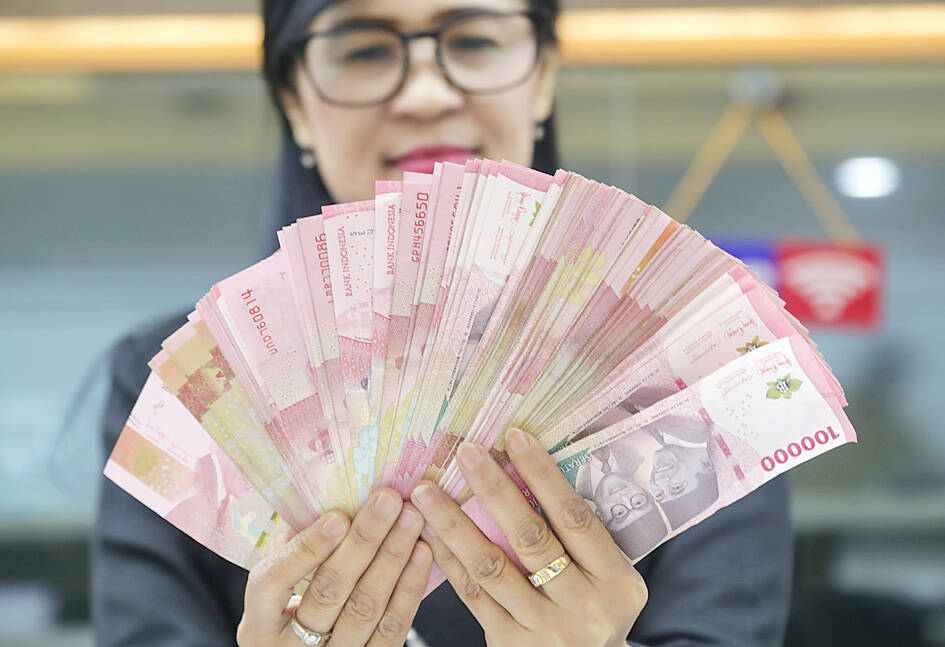Indonesia’s central bank is stepping into the market to support the rupiah that is in its longest losing streak since last year.
Bank Indonesia (BI) is intervening in the spot, domestic non-deliverable forwards and bond markets to maintain currency supply and demand balance, central bank monetary management executive director Edi Susianto said.
“Market confidence needs to be maintained,” Susianto said, adding that the weakness is largely driven by external sentiments.

Photo: Bagus Indahono, EPA-EFE
Susianto’s comments come with the currency set to decline for a sixth straight day. The rupiah along with other emerging market (EM) currencies are coming under depreciation pressure, as signs of resilience in the US economy bolster the US dollar.
“Global market developments have been rather unfavorable for EM currencies, including the rupiah, due to escalating tensions in the Middle East and recent better-than-expected US jobs data,” Susianto said.
The currency weakened as much as 1.3 percent to 15,693 rupiah per US dollar yesterday. It had rallied more than 8 percent in the third quarter on expectations that the US Federal Reserve would persist with heavy rate cuts after its recent half percentage point reduction.
BI was seen supporting the currency in early trading, traders said. That was the first time in months that the central bank had intervened in the market.
The Indonesian central bank has ample resources to support the rupiah, with its foreign exchange reserves remaining near a record. The stockpile stood at US$149.9 billion last month, covering 6.4 months of imports and external debt servicing requirements.
The weakness in the rupiah has lifted expectations that BI might keep its policy rate on hold at its meeting on Wednesday next week after a surprise rate cut last month.
Meanwhile, the New Taiwan dollar ended down NT$0.168, or 0.52 percent, at NT$32.131 against the US dollar in Taipei on Monday, its lowest level since Sept. 10, when it closed at NT$32.173.
Dealers said the US dollar attracted strong buying soon after the local forex market opened, as investors were encouraged by the US nonfarm payroll report, which showed some 254,000 jobs were created last month, beating an earlier market estimate of 150,000.
The robust jobs report might prompt the Fed not to make big rate cuts later this year, following its aggressive 50 basis point reduction last month, dealers said. As a result, the US Dollar index, which traces the value of the currencies of Washington's six major trading partners, rose yesterday, they noted.
According to Taiwan's central bank, the US Dollar index rose 0.61 percent yesterday, sending down regional currencies, with the Japanese yen falling 1.33 percent, the South Korea won 0.64 percent and the Singapore dollar 0.54 percent.
The weakness of those Asian currencies put pressure on the NT dollar throughout yesterday's session, dealers said.
Additional reporting by CNA

TECH CLUSTER: The US company’s new office is in the Shalun Smart Green Energy Science City, a new AI industry base and cybersecurity hub in southern Taiwan US chip designer Advanced Micro Devices Inc (AMD) yesterday launched an office in Tainan’s Gueiren District (歸仁), marking a significant milestone in the development of southern Taiwan’s artificial intelligence (AI) industry, the Tainan City Government said in a statement. AMD Taiwan general manager Vincent Chern (陳民皓) presided over the opening ceremony for the company’s new office at the Shalun Smart Green Energy Science City (沙崙智慧綠能科學城), a new AI industry base and cybersecurity hub in southern Taiwan. Facilities in the new office include an information processing center, and a research and development (R&D) center, the Tainan Economic Development Bureau said. The Ministry

ADVERSARIES: The new list includes 11 entities in China and one in Taiwan, which is a local branch of Chinese cloud computing firm Inspur Group The US added dozens of entities to a trade blacklist on Tuesday, the US Department of Commerce said, in part to disrupt Beijing’s artificial intelligence (AI) and advanced computing capabilities. The action affects 80 entities from countries including China, the United Arab Emirates and Iran, with the commerce department citing their “activities contrary to US national security and foreign policy.” Those added to the “entity list” are restricted from obtaining US items and technologies without government authorization. “We will not allow adversaries to exploit American technology to bolster their own militaries and threaten American lives,” US Secretary of Commerce Howard Lutnick said. The entities

Minister of Finance Chuang Tsui-yun (莊翠雲) yesterday told lawmakers that she “would not speculate,” but a “response plan” has been prepared in case Taiwan is targeted by US President Donald Trump’s reciprocal tariffs, which are to be announced on Wednesday next week. The Trump administration, including US Secretary of the Treasury Scott Bessent, has said that much of the proposed reciprocal tariffs would focus on the 15 countries that have the highest trade surpluses with the US. Bessent has referred to those countries as the “dirty 15,” but has not named them. Last year, Taiwan’s US$73.9 billion trade surplus with the US

The Taipei International Cycle Show (Taipei Cycle) yesterday opened at the Taipei Nangang Exhibition Center, with the event’s organizer expecting a steady recovery in the industry this year following a tough last year. This year, 980 companies from 35 countries are participating in the annual bicycle trade show, showcasing technological breakthroughs and market development trends of the bicycle industry at 3,600 booths, the Taiwan External Trade Development Council (TAITRA, 外貿協會) said in a statement. Under the theme “Ride the Revolution,” the exhibition has attracted more than 3,500 international buyers from 80 countries to preregister for the four-day event, which is expected to